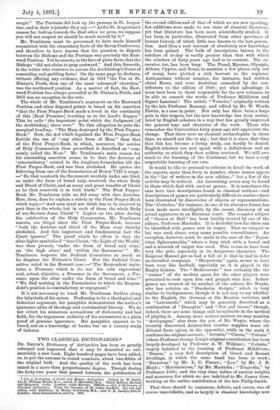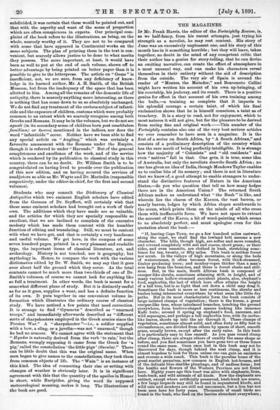TWO CLASSICAL DICTIONARIES.* DR. SMITH'S Dictionary of Antiquities has been
so greatly enlarged and improved, that it may be described as sub- stantially a new book. Eight hundred pages have been added, or, to put the amount in round numbers, about two-fifths of the original bulk. And the quality of the work has been raised in a more than proportionate degree. Though during the forty-two years that passed between the publication of
• (1.) A Dictionary of Greek and Roman Antiquities. Third Edition, Revised ities„ Edited by W. Smith, LL.D., William Wayte, and G. B. Marindin, and Enlarged. 2 vols. London: John Murray. 1890-21.--(2.) A Dictionary of Classical Antiquities. From the German of Dr. Oskar Seyffert. Revised and edited, with Additions, by. Henry Nettleship, M.L, and J. B. Sandys, Litt.D. London : Swan Sonneneehem and Co. 189L
the second edition and of that of which we are now speaking, few additions were made to our store of classical literature, yet that literature has been more scientifically studied. It has been, in particular, illustrated from other provinces of human history, of which little was known to the last genera- tion. And then a vast amount of absolutely new knowledge has been gained. The bulk of inscriptions known to the scholars of to-day is vastly greater than that with which the scholars of forty years ago had to be content. The ex- cavator, too, has been busy. The Troad, Mycence, Olympia, Athens, Cyprus, and Rome, to mention a few places only out of many, have yielded a rich harvest to the explorer. Antiquarians without number, for instance, had written about Rome, and were doubtless consulted by the con- tributors to the edition of 1848 ; yet what advantage it must have been to those responsible for the new volumes, to be able to consult the works of Professor Middleton and Signor Lanciani ! The article " Vestales," originally written by the late Professor Ramsay, and edited by Mr. W. Warde Fowler, is a case in point. Not only has there been a large gain in this respect, but the new knowledge has been assimi- lated by English scholars in a way that has greatly improved the general tone and character of the work. Those who remember the Universities forty years ago will appreciate the change. That there were no classical archaaologists in those days, we should not like to say; but that it is since that time that this has become a living study, can hardly be denied. English scholars can now speak with a definiteness and an authority on which they then seldom ventured. We still owe much to the learning of the Continent, but we have a very respectable learning of our own.
It would be idle to pretend to criticise in detail the work of the experts, more than forty in number, whose names appear in the " list of writers in the new edition ;" but a few of the articles may be noticed. An interesting series may be found in those which deal with ancient games. It is sometimes the case here that descriptions found in classical authors—and descriptions of games are particularly difficult to realise—have been illustrated by discoveries of objects or representations. The " Cottabos," for instance, in one of its obscurer forma, has been made more intelligible by the recent discovery of an actual apparatus in an Etruscan tomb. The complex subject of " Games at Ball " has been lucidly treated by one of the editors, Professor Marindin. It is doubtful how far these can be identified with games now in vogue. That no racquet or bat was used, clears away many possible resemblances. An exception, however, must be made in the case of the " Eques- trian Sphasiromachia," where a long stick with a broad end and a network of catgut was used. This seems to have been very like polo, especially in its dangerous character. The Emperor Manuel got so bad a fall at it that he had to defer an intended campaign. " Harpastum," again, seems to have been very like football, especially as it is played in the Rugby fashion. The " Medicurrens " was certainly like the " runner " of the modern game, for the other players were permitted to rush upon him and grapple with him. Indoor games are treated of by another of the editors, Mr. Wayte, who has articles on " Duodecim Scripta," which is very similar to backgammon, though it is not easy to say whether to the English, the German, or the Russian varieties, and on "Latrunculi," which may be generally described as a. combination of "Draughts" and "Fox and Geese," though, indeed, there are some things still inexplicable in the method of playing it. Among more serious matters we may mention " Areiopagus," also from the pen of Mr. Wayte, where the recently discovered Aristotelian treatise supplies some ad- ditional facts (given in the appendix), while in the main it confirms the oil ginal account ; " Arvales," " Circus," " Colonia " (where Professor George Long's original contribution has been largely developed by Professor A. W. Wilkins); " Colonia," largely indebted to the learning of Professor Middleton ; "Domus," a very full description of Greek and Roman dwellings, in which the same hand has been at work ; "Exercitus," by Mr. L. C. Purser; " Lex," by Mr. J. B. Moyle ; " Matrimonium," by Mr. Marindin ; " Tragcedia," by Professor Jebb ; and the very clear tables of ancient weights and measures, for which we are indebted to Mr. James Gow, working on the earlier contribution of the late Philip Smith.
That there should be omissions, defects, and errors, was of course unavoidable, and so largely is classical knowledge now
subdivided, it was certain that these would be pointed out, and that with the asperity and want of the sense of proportion which are often conspicuous in experts. Our principal com- plaint of the book refers to the illustrations, as being, on the whole, scarcely worthy of it. They are not to be compared with some that have appeared in Continental works on the same subjects. The plan of printing them in the text is con- venient, but scarcely allows justice to be done to what merits they possess. The more important, at least, it would have been as well to put at the end of each volume, shown off to better advantage by being printed on better paper than it is possible to give to the letterpress. The article on " Gems " is insufficient, not, we are sure, from any deficiency of know- ledge in its learned author, Mr. A. H. Smith, of the British Museum, but from the inadequacy of the space that has been allotted to him. Among all the remains of the domestic life of antiquity, there is scarcely anything more interesting, as there is nothing that has come down to us so absolutely unchanged. We do not find any treatment of the curious subject of infanti- cide and the exposure of children, customs which were probably common to an extent which we scarcely recognise among both Greeks and Romans. It may be in the volumes, but we do not see agnati (in its secondary sense of children born post constitutam familiam) or Opeirroi, mentioned in the indices, nor does the word "infanticide " occur. Neither have we been able to find any special article on " Angling," which was certainly a favourite amusement with the Romans under the Empire, though it is referred to under " Harundo." But of the general completeness and excellence of the work, and of the service which is rendered by its publication to classical study in this country, there can be no doubt. Dr. William Smith is to be congratulated on having lived to preside over the publication of this new edition, and on having secured the services of coadjutors so able as Mr. Wayte and Dr. Marindin (responsible respectively, under the editor-in-chief, for the first and second volumes).
Students who may consult the Dictionary of Classical Antiquities which two eminent English scholars have edited from the German of Dr. Seyffert, will certainly wish that these same eminent scholars had brought out a work of their own. The additions which they have made are so valuable, and the articles for which they are specially responsible so excellent, that we are inclined to complain of the excessive modesty which has made them content with the humbler function of editing and translating. Still, we must be content with what we have got, and that is certainly a very handsome and useful volume. We get here, in the compass of some seven hundred pages, printed in a very pleasant and readable type, the important items of classical literature, art, and archaeology. History is not touched, nor is geography, but mythology is. Hence, to compare the work with the various dictionaries edited by Dr. W. Smith, we may say that it goes over about half the ground which they cover. As the total contents cannot be much more than two-thirds of one of Dr. Smith's volumes, of course we cannot look for anything like so full a treatment. In other words, the book is meant for a somewhat different plane of study. But it is distinctly useful as far as it goes, supplies a want, and has a definite function of its own. It puts together in one convenient volume in- formation which illustrates the ordinary course of classical study. We have noticed a few points that need correction. It is strange to find " Gymnetm " described as " unarmed troops," and immediately afterwards described as "different sorts of sharpshooters employed in the Greek armies since the Persian War." A " sharpshooter "—i.e., a soldier supplied with a bow, a sling, or a javelin—was not " unarmed," though be bad no armour. We cannot agree with the statement that " Hyades is naturally derived from the verb to rain,' but the Romans, wrongly supposing it came from the Greek for a pig,' called the constellation the little pigs' (Sum/4." There can be little doubt that this was the original name. When men began to give names to the constellations, they took them from common objects of life. The " Wain" is an instance of this kind. The idea of connecting their rise or setting with changes of weather is obviously later. Jt is in significant agreement with this that the quantity of the upsilon in Homer is short, while Euripides, giving the word its supposed meteorological meaning, makes it long. The illustrations of the book are good.











































 Previous page
Previous page